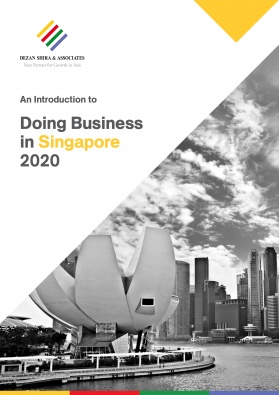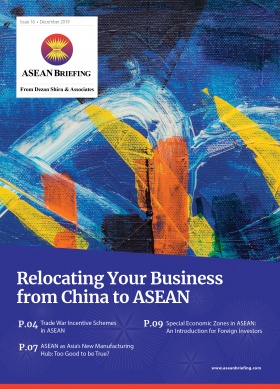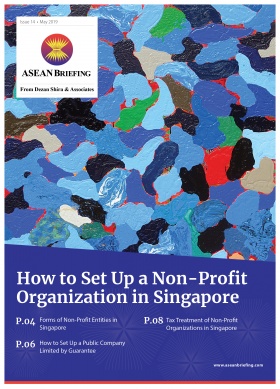Singapore Announces Second COVID-19 Stimulus Package: Salient Features
- On March 26, 2020, the Singaporean government launched its second stimulus package to counter the economic fallout of the coronavirus (COVID-19) pandemic.
- The stimulus plan is estimated to be worth S$48 billion (US$33.7 billion), drawing on national reserves for the first time since the global financial crisis in 2009.
- The budget aims to support local businesses through the deferment of taxes, tax rebates, and loan schemes, as well as supporting low-income workers and self-employed persons through new training programs and cash handouts.
On March 26, 2020, the Singaporean government launched its second stimulus package to counter the economic fallout of the COVID-19 pandemic.
Named the Resilience Budget, the stimulus plan is estimated to be worth S$48 billion (US$33.7 billion), drawing on national reserves for the first time since the global financial crisis in 2009. The country’s Finance Minister, Heng Swee Keat, has said the additional spending will widen the budget deficit to 7.9 percent of GDP, markedly higher than the previous target of 2.1 percent.
The budget aims to support local businesses through the deferment of taxes, tax rebates, and loan schemes, as well as supporting low-income workers and self-employed persons through new training programs and cash handouts. The government will also provide financial assistance to Singaporean households and will exercise greater flexibility on fees and loans.
This latest budget comes after the government committed to S$6.4 billion (US$4.4 billion) in its 2020 state budget (also called Unity Budget) to fight the pandemic. Introduced in February 2020, the budget focused on providing short-term financial support for businesses and families impacted by the outbreak.Furthermore, the Ministry of Power (MOM) has issued advice to businesses on alternatives to retrenchment to help keep their business viable so that fewer jobs are lost.
Investors should seek the help of qualified local advisors to better understand the available relief programs and application assistance, as well as HR retrenchment, restructuring, and outplacement.
More support for businesses
The government has provided a variety of tax deferments and rebates to support businesses. In addition, there are also rental waivers, financing schemes for companies, and incentives for specific sectors.
Deferment of income tax
To help ease the immediate cash flow problems businesses are currently facing, the government has granted an automatic deferment of income tax payments for companies and self-employed persons for the next three months. Businesses should contact the Inland Revenue Authority of Singapore (IRAS) for further assistance.
Property tax rebates
In the Unity Budget, the government provided property tax rebates of between 15 and 30 percent for the accommodation and function room components of Meetings, Incentives, Conventions, and Exhibitions (MICE) venues, commercial properties, and the main international airport.
Under the Resilience Budget, the type of properties eligible for this incentive has been expanded with the tax rebate rate also increased to between 30 to 100 percent. The list can be found in the annex here. The government hopes this will allow landlords to reduce rentals to tenants.
Moreover, qualifying commercial properties impacted by the pandemic, such as hotels, tourist attractions, and serviced apartments will pay no property tax for the 2020 financial year.
Financing schemes for businesses
The government through Enterprise Singapore (ES), an organization under the Ministry of Trade designed to assist the development of small and medium-sized enterprises (SMEs), has issued the trade loan financing scheme (EFS-Trade Loan) to help finance an enterprise’s’ domestic and international transactions. This includes:
- Inventory and stock financing;
- Overseas working capital loan; and
- Pre-delivery working capital.
Through the EFS-Trade Loan, the government will increase the maximum loan quantum from S$5 million (US$3.4 million) to S$10 million (US$6.9 million) with the government’s risk share also increased from 70 to 80 percent.
Businesses can also apply for short-term trade financing loans through the Loan Insurance Scheme (LIS). The government has increased subsidies to businesses under this scheme from 50 to 80 percent.
Under the Unity Budget, SMEs were eligible to receive a loan quantum of S$600,000 (US$418,000). This has now been further increased to S$1 million (US$696,000). There is also an additional S$20 billion (US$13.9 billion) in loan capital
Rental waivers
The National Environmental Agency (NEA) will give stallholders in hawker centers three months of rental waiver, an increase from the one month issued in the Unity Budget. To be eligible, the centers must be those managed by the NEA.
Support for specific sectors
The government has laid out new incentives for the tourism and aviation industries, the two most impacted due to the pandemic. As of March 24, 2020, air traffic has fallen by 90 percent and the national carrier, Singapore Airlines (SIA), announced a 96 percent cut in its scheduled capacity up till the end of April.
Singapore is a global connectivity hub with the airport and its adjacent industries contributing to more than 5 percent of GDP.
Aviation industry
For every local worker in employment, the government will provide a 75 percent wage offset for the first S$4,600 (US$3,205) in monthly wages through the Jobs Support Scheme. Under the Unity Budget, the government introduced the Jobs Support Scheme and the Wage Credit Scheme to help businesses through wage support.
The government will also introduce a S$350 million (US$243 million) aviation support package in the form of rebates on landing and parking charges and rental relief for airlines and cargo agents.
Tourism industry
The tourism industry will benefit from the Jobs Support Scheme, which is open for licensed hotels, travel agencies, tourist attractions, and purpose-built MICE operators, among others. There is also an additional S$90 million (US$62 million) in funding for the industry.
Food services
Firms in the food and beverages (F&B) industry are eligible to apply for the Jobs Support Scheme. For this industry, the government will provide a 50 percent wage offset for the first S$4,600 (US$3,205) in monthly wages.
Supporting workers and protecting jobs
Over one-third of the budget is dedicated to protecting the livelihood of workers.
The government will raise the percentage of co-funding of wages from eight to 25 percent. The monthly wage ceiling allowance will also be raised from S$3,600 (US$2,500) to S$4,600 (US$3,205). The Jobs Support Scheme will be extended to the end of 2020. These incentives are expected to cost the government S$15.1 billion (US$10.4 billion).
Lower-income Singaporean workers will receive a S$3,000 (US$2,000) one-off cash payment.
Self-employed persons will be provided with S$1,000 (US$696) per month for the next nine months. In total, the government has set aside S$1.2 billion (US$836 million) for this relief. The government will provide subsidies, which includes covering up to 90 percent of fees for any self-employed persons looking to engage in reskilling or training programs.Assisting households
Singaporeans will receive a one-off cash payment ranging from S$300 (US$209), to S$900 (US$627) depending on their income, and a cash payment to each Singaporean parent with at least one young child of S$300 (US$209). These have been tripled from the Unity Budget.
The new budget also triples the value of grocery vouchers for families from S$100 (US$70) to S$300 (US$209).
Flexibility on fees and loans
The government will freeze all government fees and charges for one year, starting from April 1, 2020, to March 31, 2021. Loan repayment and interest charges for student loans will be suspended for one year and late payment on mortgage arrears are to be suspended for three months.
Alternatives to retrenchment
The Ministry of Manpower has issued advice to businesses on alternatives to retrenchment. These include:
Temporary layoffs
Employers can ask employees to stop coming to work for a short period. Employers, however, must pay 50 percent of the gross salary during the days they are temporarily laid off. Employers can also ask employees to take up to 50 percent of their annual leave and any layoff period cannot exceed one month.
Re-training
Employers should tap into the SkillsFuture program established by the government. This program will assist individuals in gaining new skills (SkillsFuture), enhance the role of businesses in developing their staff (SkillsFuture Enterprise), and support mid-career workers to help them stay employed (SkillsFuture Mid-Career).
Reducing workdays
Employers can implement a shorter week, but this should not exceed more than three days in a week and should not last more than three months.
About Us
ASEAN Briefing is produced by Dezan Shira & Associates. The firm assists foreign investors throughout Asia and maintains offices throughout ASEAN, including in Singapore, Hanoi, Ho Chi Minh City and Jakarta. Please contact us at asia@dezshira.com or visit our website at www.dezshira.com








